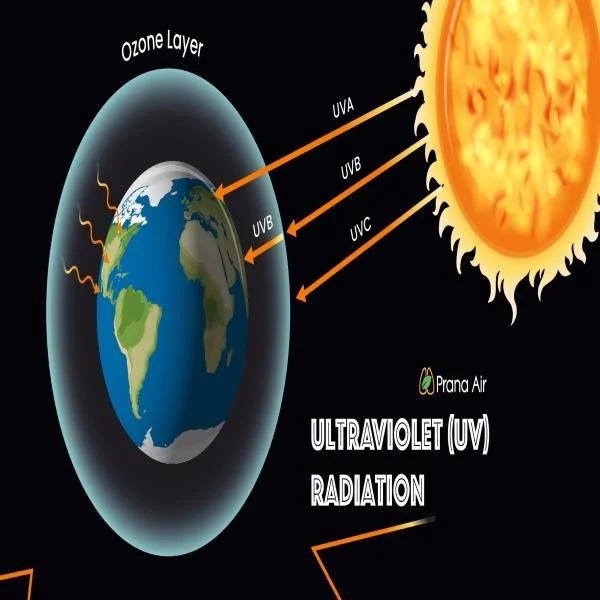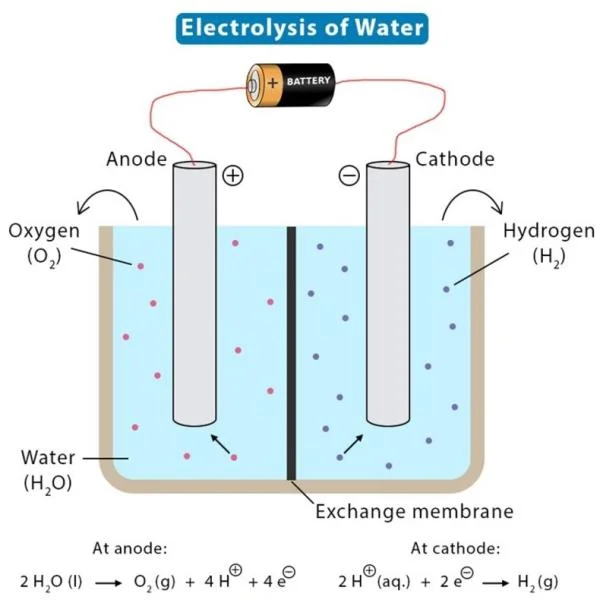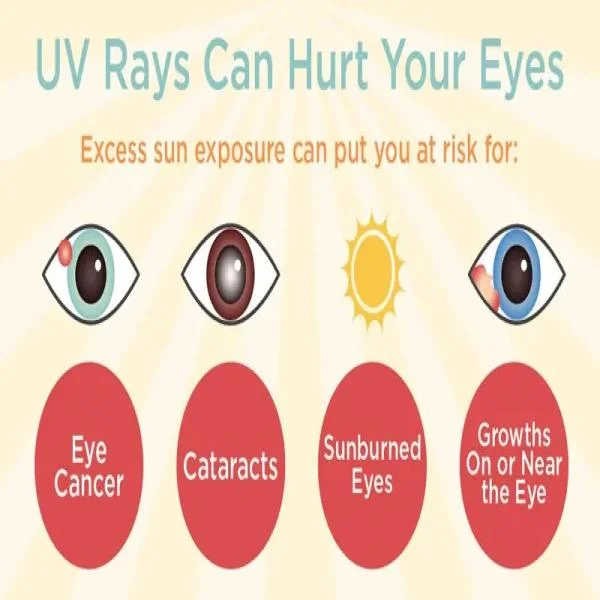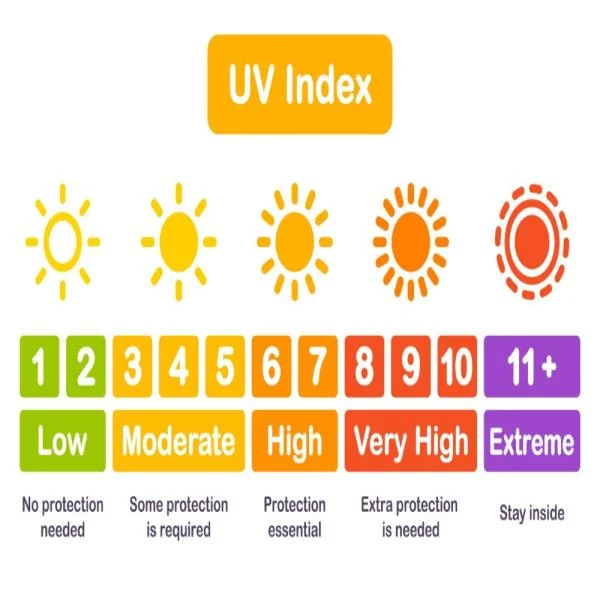
Sunlight plays an essential role in human health, providing Vitamin D and improving mood. However, it also contains harmful ultraviolet (UV) rays, particularly UVA and UVB, which can lead to skin damage and increase the risk of skin cancer. This article explores the differences between UVA and UVB rays , their effects on the skin, and how you can protect yourself from excessive exposure.
What Are UVA and UVB Rays?
Ultraviolet (UV) rays are a type of radiation emitted by the sun and certain artificial sources like tanning beds. These rays are invisible to the naked eye and are divided into two main categories based on their wavelength: UVA and UVB.
- UVA Rays: These rays have the longest wavelength, making up about 95% of the UV radiation that reaches the Earth's surface. They penetrate the skin deeply, affecting the dermis (the thickest layer of the skin) and are primarily responsible for premature aging, wrinkles, and sunspots. UVA rays can also damage DNA, increasing the risk of skin cancer.
- UVB Rays: UVB rays have a shorter wavelength and are primarily responsible for causing sunburn. They affect the outermost layer of the skin (the epidermis) and play a key role in the development of skin cancer. Unlike UVA rays, UVB rays are more intense during the summer months and at higher altitudes, where the Earth's atmosphere offers less protection.
The Effects of UVA and UVB Rays on the Skin
Both UVA and UVB rays can cause significant damage to the skin, but they do so in different ways:
- UVA Rays and Skin Aging: UVA rays penetrate deep into the skin, breaking down collagen and elastin fibers, which are responsible for maintaining the skin's structure and elasticity. Over time, exposure to UVA rays leads to photoaging, which manifests as fine lines, wrinkles, and hyperpigmentation (sunspots). UVA rays are also responsible for the development of certain skin cancers, including melanoma, the deadliest form of skin cancer.
- UVB Rays and Sunburn: UVB rays primarily affect the outer layer of the skin, causing sunburn and reddening. Prolonged exposure to UVB rays can lead to more serious consequences, including DNA damage and mutations that contribute to skin cancer development. UVB radiation is particularly harmful during peak sunlight hours (10 AM to 4 PM) when the sun is directly overhead.
- DNA Damage and Skin Cancer Risk: Both UVA and UVB rays can cause mutations in skin cells' DNA, increasing the risk of skin cancer. UV radiation causes thymine dimers to form in DNA, which can lead to uncontrolled cell growth. Basal cell carcinoma, squamous cell carcinoma, and melanoma are the most common types of skin cancer associated with UV exposure.
Protecting Yourself from UVA and UVB Rays
Given the harmful effects of UV radiation, it’s essential to take proactive steps to protect your skin from both UVA and UVB rays. Here are some key strategies:
- Use Broad-Spectrum Sunscreen: Broad-spectrum sunscreen protects against both UVA and UVB rays. Choose a sunscreen with an SPF (Sun Protection Factor) of at least 30 for everyday use and SPF 50 for extended outdoor activities. Reapply every two hours or immediately after swimming or sweating.
- Wear Protective Clothing: Long sleeves, wide-brimmed hats, and sunglasses with UV protection can shield your skin and eyes from harmful rays. Dark-colored, tightly woven fabrics offer more protection than lighter materials.
- Seek Shade: Avoid direct sun exposure, especially during peak hours. Seek shade under trees, umbrellas, or shelters to minimize your exposure to UV rays.
- Avoid Tanning Beds: Tanning beds emit UVA rays that are even more intense than the sun’s natural rays. Regular use of tanning beds significantly increases your risk of skin cancer and accelerates skin aging.
- Be Cautious in High-Altitude and Snowy Environments: UV radiation is stronger at higher altitudes and can reflect off surfaces like water, snow, and sand. Use extra protection when engaging in outdoor activities in these environments.
Sunscreen and Its Role in UVA and UVB Protection
One of the most effective ways to protect your skin from UV radiation is by using sunscreen. Not all sunscreens are created equal, so it's important to choose the right one for optimal protection. Here’s what to look for:
- SPF Rating: The SPF number indicates how well the sunscreen protects against UVB rays. An SPF of 30 blocks approximately 97% of UVB rays, while SPF 50 blocks about 98%. No sunscreen can block 100% of UVB rays, so regular reapplication is necessary.
- Broad-Spectrum Protection: Sunscreens labeled as “broad-spectrum” provide protection against both UVA and UVB rays. This is crucial for preventing skin aging and reducing the risk of skin cancer.
- Water Resistance: If you’re swimming or sweating, opt for a water-resistant sunscreen that lasts longer. However, reapply frequently, especially after being in the water.
The Importance of Vitamin D and Sun Exposure
While protecting yourself from UV rays is vital, it’s also important to consider the role of sunlight in Vitamin D production. Vitamin D is essential for bone health, immune function, and overall well-being. Small amounts of sun exposure (10 to 15 minutes a few times a week) can help your body produce Vitamin D. However, it’s still crucial to avoid excessive exposure that could lead to skin damage.
For individuals concerned about getting enough Vitamin D while using sunscreen, Vitamin D supplements and fortified foods can provide a safe alternative without increasing the risk of UV damage.
Conclusion
Dong A has shared with readers the essential knowledge about the differences between UVA and UVB rays , and their effects on the skin . By understanding the differences between UVA and UVB rays, you can make informed choices to protect your skin while still enjoying the benefits of the sun.
If you need more references about our water treatment products, please visit the official website of Dong A Chemical at dongachem.com or call a hotline (+84) 985797941 to receive advice and support from the experienced consultant.
Related Articles
Understanding Ultraviolet Radiation: Benefits, Risks, and Applications
Ultraviolet radiation is a type of electromagnetic radiation that comes primarily from the sun. ...
Why Pool Electrolysis Is Key to Cleaner, Healthier Swimming Pools
Pool maintenance is essential to owning a swimming pool, ensuring the water remains clean, safe, and ...
Applications Electrolysis of Salt Water and How It Works?
Electrolysis of salt water is a fascinating chemical process with broad applications, from producing ...
How Can UV Rays Damage Eyes and How to Protect Them
Exposure to ultraviolet (UV) radiation from the sun can cause significant damage to your eyes over ...
What Is the UV Index and Why It Matters for Your Skin and Health
The UV Index is a critical tool for understanding the levels of ultraviolet (UV) radiation from the ...
Why UV Water Treatment is the Solution to Clean Water
Ultraviolet water treatment is becoming an increasingly popular method for purifying water in homes, ...






